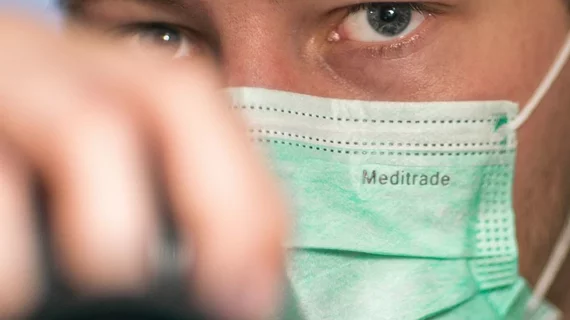New COVID-19 side effect: MRI links severe infection to dangerous eye problems
Experts are recommending patients with COVID-19 undergo eye screenings after imaging spotted “significant” abnormalities in some individuals with severe infection.
That’s according to a study of more than 120 patients undertaken by researchers at the French Society of Neuroradiology, published Tuesday in Radiology. All of the nine patients with abnormalities had nodules in the area behind their eye known as the macular region, which is crucial for central vision
There have been past reports of unusual eye findings on MRI exams, the authors explained, but nodules in the rear of the eyeball are a novel discovery.
“We showed that a few patients with severe COVID-19 from the French COVID-19 cohort had one or several nodules of the posterior pole of the globe,” lead author Augustin Lecler, MD, PhD, a neuroradiologist at the Foundation Adolphe de Rothschild Hospital in Paris, said in a statement. “This is the first time these findings have been described using MRI.”
For their retrospective investigation, Lecler and colleagues looked at brain MR imaging in 129 patients with severe COVID-19 who were treated across 16 hospitals between March 4 and May 1.
Overall, nine (7%) patients had abnormal eye findings, and each individual had one or more nodules in the back part of their eye responsible for central vision. Eight of the nine had nodules in both eyes and the same proportion had spent time in the intensive care unit for their disease.
Given these findings, Lecler et al. suggest screening all patients with severe COVID-19 to detect eye nodules. This may include high-resolution MRI, fundoscopy and optical coherence tomography, they explained.
“We believe those patients should receive specific eye-protective treatments,” Lecler added Tuesday.
The exact cause of these abnormalities remains unknown, but the team is performing follow-up research using ophthalmological tests to compare with their MRI results. They have also started a new study to determine if patients with moderate COVID-19 experience similar eye problems.
“We have launched a prospective study with dedicated high-resolution MR images for exploring the eye and orbit in patients with light to moderate COVID,” Lecler said. “Therefore, we will be able to know whether our findings were specific to severe COVID patients or not.”
Read the entire study here.

